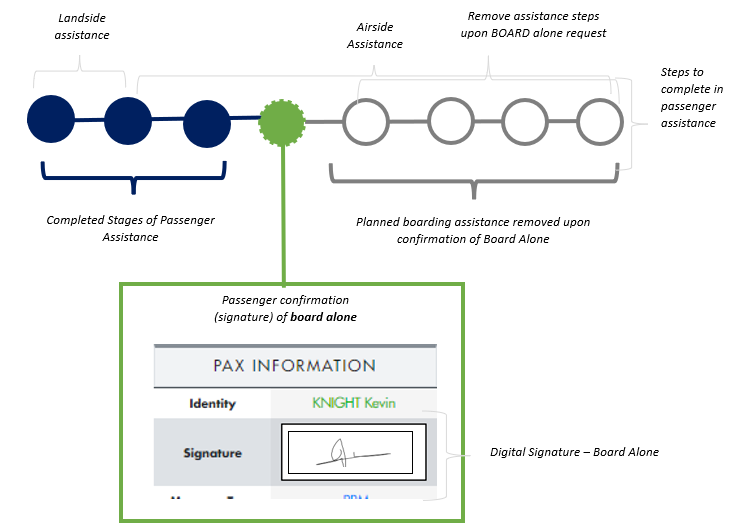
Safeguarding Your PRM Service for Board Alone Requests and Potential Passenger Complaints
There lies the crucial responsibility of adhering to stringent regulations and ensuring passenger satisfaction within the PRM service. A scenario that frequently surfaces in the absence of robust recording and processing tools is the complaint of a PRM passenger who has been left alone at the boarding gate, despite having communicated their preference to board independently. This article delves into the legal, operational, and passenger service implications of such scenarios. It concludes by introducing a key, yet basic functionality, of PRM Manager, purposefully designed to safeguard services against these very challenges.
The Scenario
A typical situation often shared during consultation unfolds when a departing PRM passenger, having been assisted to the boarding room, informs an agent, “I’m fine from here.” This statement is interpreted as an explicit request to board the flight alone, marking the completion of their assisted journey. However, this decision can change due to a variety of personal, situational, and environmental factors, including but not limited to:
- Increased Anxiety or Stress: The dynamic and often overwhelming atmosphere of an airport can heighten stress levels, causing the passenger to reconsider their need for boarding assistance.
- Physical Condition Changes: Variations in pain levels, fatigue, or other physical conditions can emerge during their boarding break, influencing the passenger’s ability to board independently.
- Information Gaps: Passengers might not fully understand the remaining journey’s requirements, leading to an underestimation of the effort needed to board alone.
- Environmental Changes: Factors like gate changes, increased crowd sizes, or longer distances can significantly impact a passenger’s ability to navigate the boarding process independently.
- Emotional Support Needs: Fluctuations in emotional state from the initial decision point to the time of boarding can influence the passenger’s desire for assistance.
- Observation of Service Quality: Witnessing the assistance provided to others may prompt a passenger to seek similar support.
- Influence from Fellow Passengers: Interactions with or observations of other passengers can impact a PRM passenger’s decisions regarding their own assistance needs.
- Travel Circumstances: Flight delays, gate changes, or other unforeseen travel disruptions might lead a passenger to reassess their boarding capabilities.
All the factors outlined above underscore valid justifications of why a passenger may change their mind about boarding alone and while it remains crucial for PRM operations to remain vigilant and have a comprehensive understanding the focus of this article is to address the specific occurrence of complaints alleging that a request to board alone was never made. By doing so, we aim to pre-empt and mitigate potential legal and reputational consequences that may arise from such scenarios.
Legal Framework and Obligations
EU Regulation 1107/2006 presents clear mandates for the treatment of PRM passengers. It requires that airports and airlines provide the necessary assistance to ensure PRM passengers can travel comparably to others. The regulation also stipulates that such services be offered without additional charge and accommodates both advance notices and spontaneous requests for assistance.
The Complaint of Being Left Alone:
- Potential Breach of Regulation 1107/2006: If a PRM passenger is left alone at the gate contrary to their expressed wishes, it could constitute a failure to provide the necessary assistance. Such a scenario may be seen as a violation of EU regulations, especially if the passenger’s needs for support are disregarded.
- Civil Liability: Incidents where a passenger feels neglected or discriminated against can lead to civil lawsuits. Passengers might seek compensation for emotional distress, discrimination, or for not receiving the level of service they were promised or is legally required.
- Regulatory Sanctions: Failing to comply with these regulations can result in significant repercussions from aviation authorities. These may include fines, mandatory implementation of corrective measures, or comprehensive operational audits to ensure future compliance.
Mitigating the Legal Risks with PRM Manager:
In response to the challenges identified in PRM services, the Board-Alone Digital Confirmation System offers a robust solution to mitigate legal risks. Our approach utilizes an agent’s Personal Digital Assistant (PDA) to capture a PRM passenger’s digital signature, confirming their specific service requests, such as opting to board alone.
Upon a PRM passenger expressing their boarding preference, an agent presents the PDA for the passenger to digitally sign, officially documenting their request. This system seamlessly integrates into the current service workflow, ensuring that the passenger’s consent and decisions are recorded accurately and securely.
The efficiency and user-friendliness of this process are key; it enables passengers to effortlessly communicate their preferences, reducing the likelihood of misunderstandings or miscommunications. Additionally, this digital confirmation aids in maintaining comprehensive and secure records, crucial for legal compliance and for addressing any subsequent disputes or complaints.
Importantly, the system adheres to strict data security protocols, ensuring that all personal information is handled with the utmost confidentiality and in compliance with privacy regulations. This not only protects the passenger’s data but also reinforces the trust in the service provider’s commitment to responsible data management.
Record Keeping and Accessibility:
Upon capturing a passenger’s signature, it is immediately stored within the PRM Manager system. This digital record acts as incontrovertible proof of the passenger’s specific request, such as their decision to board alone. The system is designed to ensure that all data is not only securely stored but also handled in compliance with the highest standards of data protection and privacy regulations.

Accessibility of these records is carefully managed. Only authorized personnel can access this sensitive information, ensuring that passenger privacy is maintained while providing the necessary oversight for service quality and compliance.
In instances where a complaint or dispute arises – for example, a passenger alleging that they did not request to board alone – the digitally signed confirmation can be promptly retrieved. This swift access to accurate records allows for a quick resolution of the issue. More importantly, it aids in understanding and addressing the underlying needs of the passenger, ensuring that their concerns are met with the appropriate response and action.
Benefits Experienced from PRM Manager Users with Board-Alone Digital Confirmation System
The implementation of a Board-Alone Digital Confirmation System in the context of PRM (Passengers with Reduced Mobility) Manager applications offers several notable benefits:
- Enhanced Accuracy and Clarity: Digital capture of passenger requests in their own handwriting minimizes miscommunication risks. This technology ensures clarity and precision in interpreting and recording passenger intentions, which is crucial for providing tailored services to passengers with reduced mobility.
- Legal Protection: Complying with regulations such as EU Regulation 1107/2006, the digital record of passenger requests acts as a significant legal safeguard. It provides concrete evidence of the airport or airline’s commitment to meeting its responsibilities, thereby reducing the potential for legal disputes. This aspect is particularly important in the highly regulated aviation industry where adherence to accessibility laws is mandatory.
- Passenger Empowerment: Allowing passengers to digitally confirm their travel preferences empowers them. This empowerment leads to a greater sense of control over their travel experience, enhancing satisfaction and loyalty. For passengers with reduced mobility, this aspect is especially vital as it directly impacts their experience and perception of independence during travel.
- Operational Efficiency: Digitization streamlines operations by reducing paperwork and manual record-keeping. This leads to more efficient service delivery, benefiting both airport staff and passengers. For staff, it means less administrative burden and for passengers, a smoother and more enjoyable travel experience. In the fast-paced airport environment, operational efficiency is key to maintaining timely services and positive passenger experiences.
Overall, the integration of a Board-Alone Digital Confirmation System within PRM Manager platforms significantly improves the travel experience for passengers with reduced mobility, while also offering operational, legal, and service quality advantages to airlines and airports.
Conclusion:
The adoption of a digital confirmation system accessed through an agent’s Personal Digital Assistant (PDA) for managing the requests of Passengers with Reduced Mobility (PRM) represents a substantial progression in airport service management. This system offers a distinct and legally robust approach to documenting passenger preferences. Such an advancement not only uplifts the quality of service provided to PRM passengers but also plays a crucial role in mitigating the risk of legal disputes. By integrating technology into service management, airports and airlines are better equipped to handle the specific needs of PRM passengers with greater accuracy, efficiency, and legal compliance, ultimately contributing to a more inclusive and positive travel experience for all passengers.
For more information on the Digital Confirmation System contact below and we’ll be happy to show you how it’s implemented.


